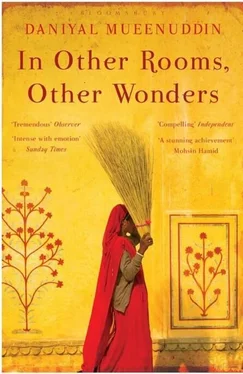After pausing for a moment, she lowered her eyes and said in a meek voice, ‘But soon I won’t be able to come here. The Begum is going on umrah, so I’ll have to be in charge of her house.’
‘Not umrah again!’ said K. K. ‘It’s becoming a vice with her. But darling, don’t be ridiculous. If she’s away you can come even more regularly.’
‘When the Begum is gone they don’t cook any food at all, just the servants’ food. I sometimes go into the bazaar to eat. And Begum Sahiba doesn’t like me to use the electricity.’
‘You poor thing,’ said K. K. ‘And you ask so little.’
Husna’s eyes became moist. ‘Yesterday Begum Sahiba had gone out when I got back to the house, and she had locked all the doors and taken the keys with her. I stood under the trees in front for three hours. And if I eat anything from the refrigerator she becomes angry at me. And when she’s gone on umrah the servants will take liberties; they’ll make jokes and want me to sit with them. She won’t leave me any money.’ She wiped her eyes with her dupatta, head cast down. ‘When Begum Sahiba is harsh, what can I do?’
‘Come, little one,’ said K. K., patting the sofa next to him. ‘Come sit here. Don’t cry.’ K. K. Harouni avoided unpleas antness at all costs, for he lived in a world as measured and as concentric as that of the Sun King at Versailles. He did not like to see her cry, because it upset him. She slipped into the place next to him and nestled under his arm, still tearful, but muffling her face in his sweater. He stroked her hair.
‘Now stop,’ he said. ‘Why don’t you come stay here while the Begum is on umrah ? I’ll have them fix up the rooms in the annex.’
Husna looked out from under her eyelashes and smiled weakly. ‘Oh, I would like that too much. Then I could keep you company when you’re alone and make your tea for you. And I would practice typing every day for a long time. And I’ll study for the M.A. exams.’
K. K. cared nothing for what his wife or the servants thought. He ordered the annex to be prepared, a suite of rooms built over some garages at the far side of the compound. The rooms had been refurbished several years earlier, when important guests from India had come for a long stay, and so Husna would live in better quarters than ever before in her life, with uninterrupted supplies of good food, servants who more or less did her bidding, and the occasional use of the car. To Husna it felt like a validation, almost like revenge, and yet with the bitterness of triumph after humiliation.
She simply disappeared from the house in Gulberg. Begum Harouni learned of her departure from the servants. The old lady stormed over to see her husband but found him impervious to her outrage.
‘I’ll never take that little … thing back into my house,’ said Begum Harouni. ‘Imagine! I picked her from the dirt, from nothing, and I fed and clothed her.’
‘It reflects well upon you, my dear,’ responded K. K. placidly.
Husna brought her shabby luggage to the house on Aikman Road, a brown suitcase bulging and strapped. She had clothes and shoes, not much else, had arrived in a rickshaw — the facts soon communicated through the house by the snickering community of washermen, drivers, sweepers, household servants. After Begum Harouni had gone on the pilgrimage, Husna asked K. K. for the use of the car, and went back to the old lady’s house. At first the butler, Chacha Latif, would not let her in, but Husna raised her voice and became abusive, and the servant, knowing that she might later be in a position to injure him, let her do what she wanted. All the closets had been locked, but she found a few of her things — a pile of Indian movie magazines, a little dish with an image of the Eiffel Tower that her grandfather had brought home from a European tour in the 1920s. When she went out, she discovered K. K.’s driver speaking with Chacha Latif.
‘What does he say?’ said Husna to the driver as they returned along Golf Road, driving in and out of shadow under flame-of-the-forest trees.
‘Nothing, Bibi,’ said Samundar Khan.
‘Nothing? Not anything at all?’ replied Husna, speaking in sharp Punjabi. And then, leaning back in the seat, added, ‘You drivers are always the clever ones.’
A week after she moved into the annex, Husna slept with K. K. Harouni. He had visitors for lunch, an old civil service friend, a State Bank governor, and his cousin, the retired General Karim, along with their wives. They took lunch in the room known as ‘the White Verandah,’ shaded by a pipul tree and overlooking a side garden. Already, in early April, the ceiling fans barely kept the room cool. Husna remained in the annex, trying to read a dull and badly printed history of the Sikh Wars, in which K. K.’s ancestors had fought. Though she wanted to make herself interesting to the old man, reading serious books, she never finished what she began, lapsing instead into daydreams or reading secondhand magazines that she bought from a used-book stall. A servant boy brought her a tray of food, the same food that the cook was serving to K. K. and his guests.
From her perch in the rooms above the garage Husna watched the guests emerge into the portico, and continue speaking to Harouni for what seemed an interminable period, before driving away. Soon afterward, a servant came to ask Husna if she would join Harouni for green tea in the garden. She walked past the formal dining room and along a corridor hung with darkened portraits of his ancestors. She felt intimidated by this house, by its heavy gloomy air, which contrasted with K. K.’s light manner, and she looked almost uncomprehendingly upon the strange objects scattered about, the ivory scabbard of a Chinese sword, a carved walnut love seat from Kashmir, numerous brass and copper figurines of Hindu gods. The house smelled of dusty carpets and disinfectant and wood polish.
K. K. was sitting under a tree in a railway chair, with two cups of green tea on a table.
‘Hello, girl,’ he said, pleased to see her, fed and mellow. ‘How lovely it is.’ Old trees were scattered around the receding lawn, creating areas of shade where the grass wouldn’t grow. A row of mulberry trees just ripening at the far end attracted sugar-heavy bees, which sipped the purple berries hanging from the branches and littering the ground. In the bleached sky, kites and vultures wheeled at a great height on the afternoon thermals, as if the sky itself were slowly turning.
Draining the tea, he said, ‘Well, my dear, it’s time for my rest.’
‘Let me massage you, Uncle,’ she suggested, blushing. Though her ambition always tolled in the background, she had come to genuinely respect him, for his unstudied fairness, his gaiety, his integrity and openness, plain and light and valuable as a metal unknown in her world. She wanted to keep her part of the bargain, and had only herself to give. It hurt her that it was so little; she imagined that her body, her virtue, meant almost nothing.
She followed him into his bedroom. Rafik had already closed the curtains and laid out K. K.’s pajamas.
‘You needn’t wake me,’ he said to Rafik, who stood by the door and who knew very well the routine to be observed on such an afternoon.
Of course she was a virgin, and that touched him. Letting him do exactly as he wanted, she wore a look in her eyes that he misunderstood as surprise and shyness, and later identified with moods that verged on madness — sequences of perplexity and focus in her eyes, expressing a hooded rage to get what she wanted. She had expected this to be as simple as the signing of a check, a payment. Instead, for a moment the romantic girl awoke, one who would have accepted another man, a man her own age, from her own station.
Читать дальше












